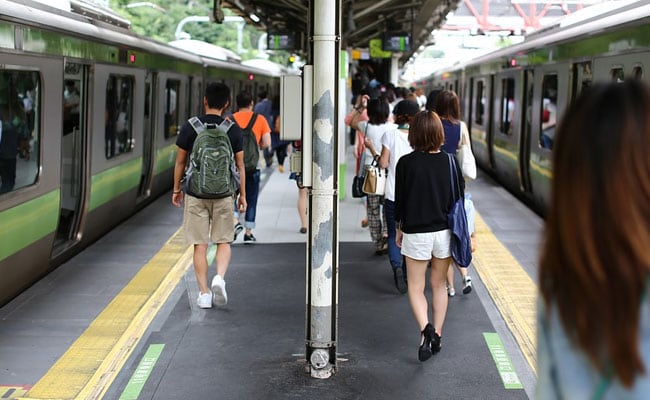
‘Karoshi’ (demise from overwork) is plaguing Japan’s work tradition. (File)
Tokyo:
In one in every of his final diary entries, Japanese trainer Yoshio Kudo lamented workdays that began early and will final till practically midnight. Two months later, he suffered “karoshi” — demise from overwork.
Kudo’s taxing schedule was removed from an exception in Japan, the place academics work a few of the longest hours on this planet, saddled with duties from cleansing and supervising college commutes to after-school golf equipment.
A 2018 OECD survey discovered Japanese center college academics work 56 hours per week, versus a median 38 hours in most developed nations.
However that also fails to account for astonishing quantities of time beyond regulation.
One probe by a union-affiliated assume tank confirmed college academics work a median 123 hours of time beyond regulation every month, pushing their weekly workload properly past the so-called “karoshi line” of 80 hours.
Lecturers say they’re reaching the breaking level, and a few have challenged the tradition by lawsuits. This 12 months, Japan’s ruling social gathering established a process drive to review the difficulty.
That got here too late for Kudo, a center college trainer, who died of a mind haemorrhage aged 40 in 2007.
At his funeral, shocked college students advised his spouse Sachiko that the vigorous bodily training trainer was the “furthest conceivable particular person from demise”.
“He simply liked working with youngsters,” Sachiko, 55, advised AFP.
However in his remaining weeks, he was struggling together with his hours.
“In the direction of the top, he was telling me that academics ought to cease working like this and that he wished to guide that change sooner or later,” his widow mentioned.
‘Kiss your weekends goodbye’
Japanese authorities have ordered steps together with outsourcing and digitalising some duties.
“Our measures to reform work circumstances for academics are making regular progress,” training minister Keiko Nagaoka advised parliament in October.
However she acknowledged that many “proceed to work lengthy hours” and “efforts should be accelerated”.
Training ministry information reveals a gradual decline in time beyond regulation, however specialists see little basic change.
From reams of paperwork to duties like lunch distribution, main each day cleansing classes with college students and monitoring kids on their technique to and from college, academics in Japan “have in a method change into handymen”, college administration guide Masatoshi Senoo mentioned.
“What ought to actually be the duty of fogeys generally spills over onto academics, who may even be despatched to apologise to native residents when college students misbehave at parks or comfort shops,” he mentioned.
One of the vital all-consuming duties is the supervision of pupil sports activities and cultural “membership” actions, usually performed after college and on weekends.
“Being assigned as main supervisor of one in every of these golf equipment normally means you need to kiss your weekends goodbye,” mentioned Takeshi Nishimoto, a highschool historical past trainer in Osaka.
In June, Nishimoto, 34, received a uncommon lawsuit looking for compensation for stress from overwork.
He filed the go well with after coming near a nervous breakdown in 2017, when the then-rugby membership supervisor labored 144 hours of time beyond regulation in a single month.
‘Sacred job’
Consultants say academics are notably weak to overwork due to a decades-old legislation that basically prevents them from being paid for time beyond regulation.
As an alternative, the legislation provides eight hours’ value of additional pay to their month-to-month salaries, a framework that Nishimoto says leads to “making academics work with out limits for mounted pay”.
Masako Shimonomura, a center college bodily training trainer in Tokyo’s Edogawa district, says it could really feel arduous to take a correct break in her day.
“Not every part about this job is ‘black’ although,” she mentioned, utilizing a Japanese time period for exploitative labour.
“There are some moments I stay for, like watching college students in my softball membership shine and smile at tournaments,” mentioned the 56-year-old, whose desk is roofed with stacks of recordsdata and paperwork.
However she fears that if circumstances do not enhance, “the picture of our career as ‘black’ will dominate for youthful generations”.
An investigation by the Mainichi newspaper revealed that within the decade to 2016, there have been 63 public college trainer deaths categorized as brought on by overwork.
However it took Kudo’s widow 5 years to get her husband’s demise recognised as karoshi, a process sophisticated by the dearth of data for his work hours.
She says educating is commonly seen as a “sacred job” dedicated to kids, so something considered as egocentric — together with paying attention to hours labored — could be frowned upon.
“So many academics remorse that they lived their lives with out stopping to benefit from the development of their very own kids,” she mentioned.
A former schoolteacher herself, Sachiko now heads an anti-karoshi group in central Japan.
“I really feel like my husband and I are working collectively to observe by on his final phrases — that he needs to alter the working practices of academics”.
(Apart from the headline, this story has not been edited by NDTV workers and is printed from a syndicated feed.)
Featured Video Of The Day
“Will Keep Optimistic”: Shah Rukh Khan’s First Feedback After Pathaan Controversy Erupts

